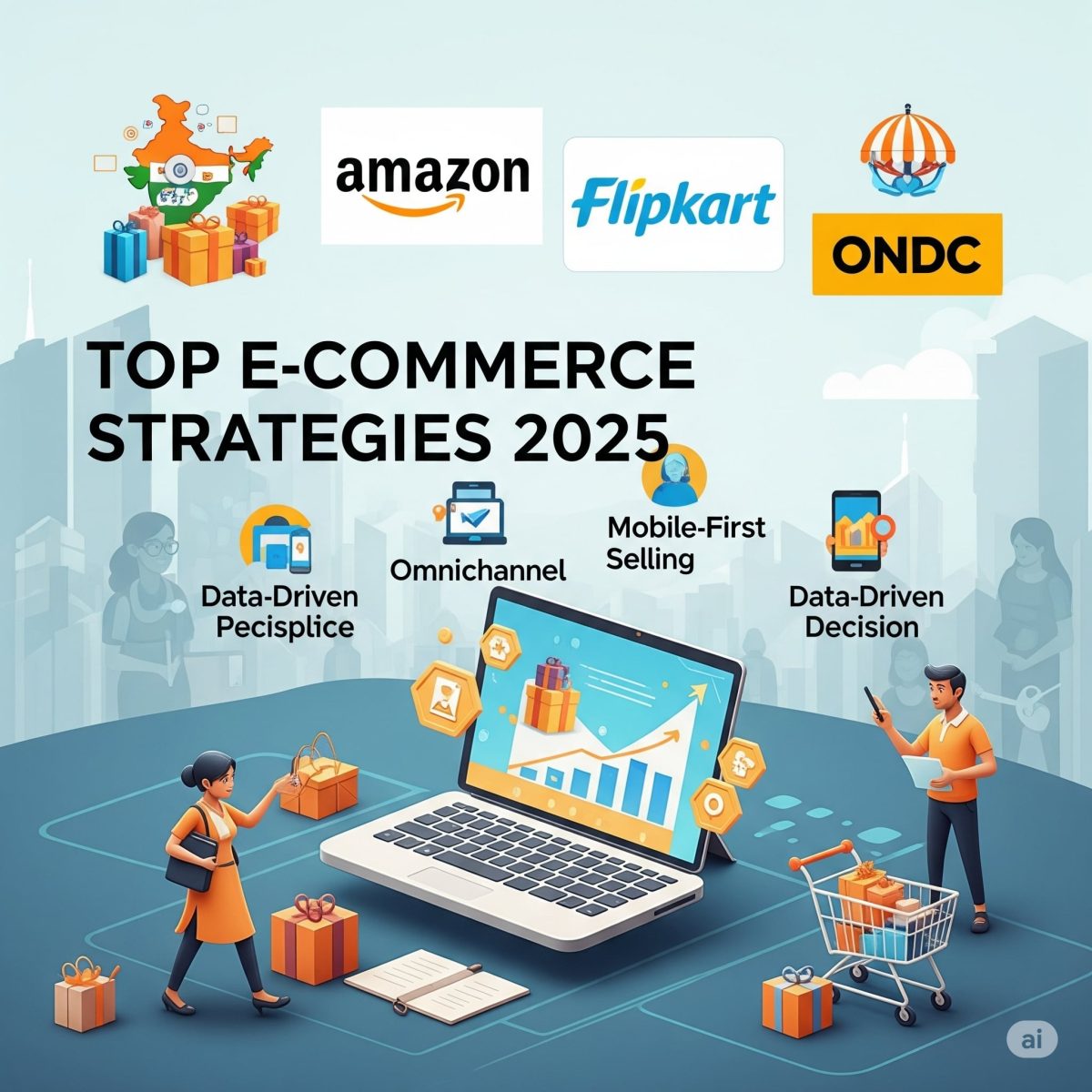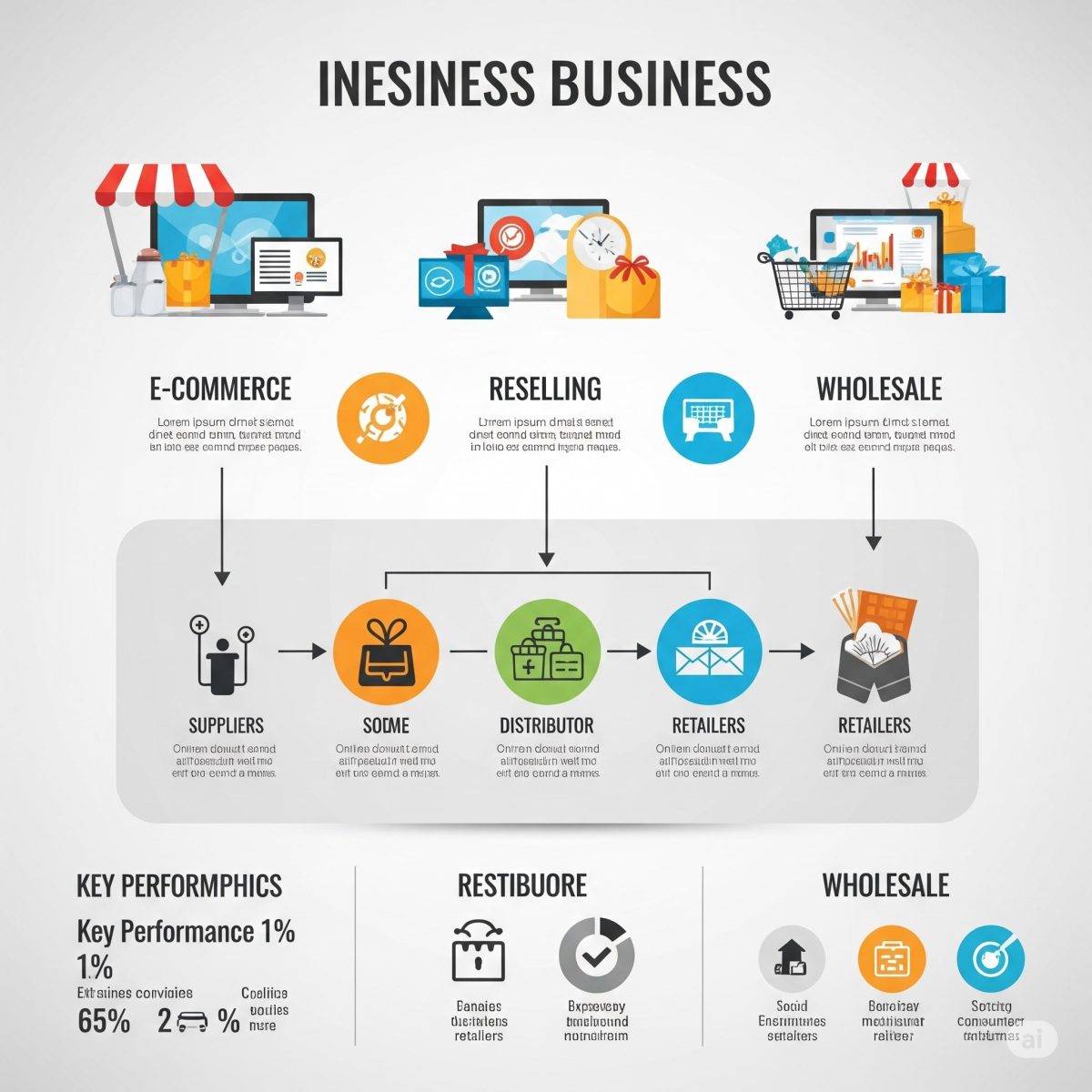India’s E-Commerce Sector has become competitive, local and tech-enabled. Multinational giants like Amazon and Flipkart already have a strong hold on the market and government-sponsored ONDC has also emerged as a new revolution. Small businesses, innovation-based Startups and work-from-home entrepreneurs are now wondering which platform will be better for them.
They question, which will give them more profits, charge less and reach customers faster. In this blog, we will compare Amazon, Flipkart and ONDC and try to understand what the e-commerce strategy should be in the year 2025.
You May Read Also:
E-Commerce vs Reselling vs Wholesale – Which One is Right for You?
DIFFERENCE BETWEEN AMAZON, FLIPKART AND ONDC
-
PRESENCE AT VARIOUS PLATFORMS
In today’s digital age, it is not wise to rely on only one e-commerce platform. Businesses should make their presence felt on every major platform.
- In Amazon, you can streamline storage and distribution through services like FBA and Seller Flex.
- Flipkart’s Plus program can provide additional benefits to customers, which help in increasing loyalty.
- Sellers on ONDC can list their products through multiple partner apps at the same time.
-
UNDERSTANDING OF MARKET
Each platform has its own reach, but it is important to adopt a different approach to reach local customers.
- Amazon’s Local Seller Program helps target customers from nearby areas.
- Flipkart Samarth program connects small town and regional sellers to the mainstream.
- ONDC enables reaching the local market without high advertising costs.
You May Read Also:
10 Tips for Starting an E-commerce Business in 2025
-
INVESTMENT FEE STRUCTURE
Knowing and managing the fees charged by the platform is crucial to maintaining profitability in the business.
- It is wise to include high-margin products in the FBA model on Amazon, even if it incurs a commission of 8-25%.
- Costs can be reduced by prioritizing low-fee categories like books and apparel on Flipkart.
- ONDC is an ideal platform for small sellers as the commission is either very low or non-existent.
-
ANALYSIS
Knowing which product is performing better in which location and on which platform is important for growth.
- Amazon’s Brand Analytics Tool helps sellers understand sales trends.
- Product performance, complaints and customer preferences can be understood through Flipkart Seller Hub.
- Apps like Paytm under ONDC use the data to give appropriate advice to the seller.
You May Read Also:
5 E-commerce Conversion rate Tips that will double your Sales
- USE OF SOCIAL MEDIA
Social media has become a powerful weapon in the modern era of marketing.
- On Amazon, Amazon Live and promotions in collaboration with social media influencers increase customer engagement.
- On Flipkart, showcasing products through videos can build trust among customers.
- ONDC does not have social media integration, so sellers there have to rely on strategies like WhatsApp, Google Business and SEO.
STRATEGY FOR EACH PLATFORM
-
AMAZON
If you are selling high-end products like laptops, home appliances, branded apparel or exportable items, Amazon is the perfect platform for you. The FBA model offers faster delivery and access to Prime customers. However, competition on Amazon is very high, so investing in promotions is essential to increase the visibility of products. Getting 5-star reviews from customers, strong service and attractive descriptions can increase sales exponentially.
-
FLIPKART
Selling cheap fashion products, local items and household goods on Flipkart can be more profitable. If your brand sells quality products at a reasonable price, then Flipkart is the best option for you. Participating in sale events here can increase sales manifold. Customers prefer Flipkart Assured sellers, so timely delivery, low returns and maintaining good customer service are important.
You May Read Also:
-
ONDC
ONDC is specifically for sellers who cannot afford the fees or complexities of larger platforms. This platform is no less than a boon for grocery stores, household product sellers, handicraft manufacturers and small industries.
Sellers can open their shop through any partner app associated with ONDC. Delivery can either be done by themselves or tie up with local courier services. Measures like WhatsApp Business, Google My Business and product listings in local languages prove to be effective in connecting customers on ONDC.
IMPORTANT STRATEGY FOR 2025
-
BE PRESENT EVERYWHERE
A smart seller does not rely on just one platform. He expands his reach through combinations like Amazon, Flipkart and ONDC. This makes it possible to deliver products to a variety of customers.
-
MAKE LOCAL CUSTOMERS YOUR TARGET AUDIENCE
The biggest advantage of ONDC is that you can reach customers in your area without any advertising cost. This is especially useful for businesses that want to make their shop digital.
-
PLAN YOUR INVESTMENT
Many sellers adopt the strategy of selling high-margin products on low-fee platforms to increase their profit margins. This also reduces their operating costs and increases their profits.
-
EFFECTIVE USE OF DATA
If a seller understands which product is being liked more on which platform, he can decide the stock and price accordingly. Making business decisions based on data is the key to success.
-
INCREASE THE USE OF SOCIAL MEDIA
Nowadays customers first see the product on social media. So use platforms like WhatsApp, Instagram and YouTube to create awareness and then drive customers to platforms like ONDC, Amazon or Flipkart.
CONCLUSION
E-commerce is no longer the domain of big brands or companies. Government-backed platforms like ONDC have given small traders, artisans and home entrepreneurs an opportunity to make their mark in the digital world.
If you sell high-quality products, take advantage of the reach of platforms like Amazon. If you are running a business on a budget, Flipkart could be the right choice. And if you are new, want to reach local customers and want independence, ONDC could be the revolutionary platform for you.
If you’re also struggling with low sales in your business, this article can be extremely helpful for you. Moreover, if you’re facing any kind of challenge in your business and are looking for expert guidance, click on the link to the Leadership Funnel Program and get in touch with us now.









